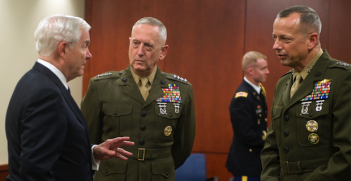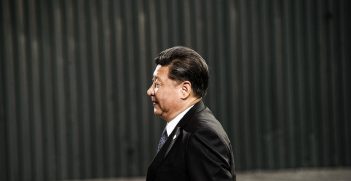Widodo Urges Indonesian Clerics to Stand up to Islamic State

With the IS seeking to expand its influence in Indonesia, incoming President Joko Widodo has urged local Muslim leaders to do more to halt the spread of radical Islamist teachings. His comments underline the precarious security situation facing Indonesia, although the country’s moderate Islamic democracy should make containing the threat far easier than in other countries.
Background
As the Islamic State (IS) looks to extend its influence in Indonesia, President-elect Joko Widodo has called on local Muslim leaders to do more to stop the spread of radical Islamist teaching. Speaking to supporters in West Java on 30 August, Widodo, universally known as Jokowi, claimed that Muslim clerics can play a crucial role in countering the rise of extremism. Although the terror threat was largely – but not totally – quashed following the 2002 Bali bombings, the dramatic ascent of IS has breathed new life into the Indonesian jihadist movement, prompting security officials to step up their efforts. While analysts have long feared the radicalisation of Indonesia, the country’s moderate Islamic democracy and religious tolerance should make containing the threat far easier there than elsewhere.
Comment
As politicians warn of rising support for the IS in Indonesia, incoming President Joko Widodo has called on Muslim leaders throughout the country to stop the spread of radical Islam. Addressing hundreds of members of a prominent Muslim organisation in West Javanese city of Depok, Jokowi, who is set to take office on 20 October, declared that ‘Muslim clerics must be able to read the situations around them.’ ‘When they detect radical movements around them,’ he added, ‘it is their duty to set things right.’ His remarks come barely a week after current President Susilo Bambang Yudhoyono warned that the security situation was becoming ‘out of control’ and required the urgent attention of international leaders around the world, including Islamic leaders.
Until recently, the terror threat within Indonesia was limited, especially after an extensive crackdown following the 2002 Bali bombings saw hundreds of individuals arrested and many fanatical organisations splinter. But observers are concerned that the dramatic ascent of the IS throughout the Middle East, which has seen it capture large swathes of territory roughly the size of Jordan, could breathe new life into the Indonesian jihadist movement. The end result, they fear, could be another large-scale attack on Indonesian soil. Already a number high-profile extremists, including Bali bombing mastermind, Abu Bakar Bashir, and Indonesia’s most wanted terrorist, Santoso, have pledged their support for IS.
At a local level, meanwhile, a YouTube recruitment video and materials supporting IS have been widely circulated. Others have reported receiving texts offering money in return for supporting IS. Unlike Syria and Iraq, where the group has achieved a number of spectacular military victories, the threat posed by IS in Indonesia remains at a grassroots level. A recent report by the S. Rajaratnam School of International Studies claims that the newly declared caliphate ‘has attracted local supporters’. Buoyed by overseas successes and a rising social media profile, it goes on to say that local followers have ‘noticeably grown.’
That makes it particularly important for Muslim leaders to denounce the movement, as Jokowi has pointed out. Many have done so already. Last month, just days after Jakarta made supporting the IS illegal, the Indonesian Ulema Council, the highest Muslim organisation in the country, banned Muslims from taking part in any IS activities. Declaring a fatwa against the group, it said that the struggle to form an Islamic caliphate through violence went against Islamic teachings. Similarly, prominent Muslim scholars, both in Indonesia and abroad, have questioned the legitimacy of an IS caliphate, which they claim is at odds with past historical caliphates.
There are other reasons to believe that any talk of a “new chapter” of terrorism emerging in Indonesia is overblown. Indeed, a number of key factors should make it difficult for the IS to take a strong hold across the archipelago. The first, and most important, is that, unlike countries such as Iraq, there are few local grievances that the IS can tap into. Indonesia remains a moderate Islamic democracy; it prides itself on religious tolerance. So, while the group has managed to attract local followers, it is unlikely to gain widespread local support. Second, bitter rivalries within the jihadist movement in Syria, especially between IS and its former ally, the al-Nusra Front, or al-Qaida in Syria, have spilled over into Indonesia. With each attracting its own set of supporters, the prospect of a unified movement appears slim. Finally, although security officials are wary of the return of Indonesian fighters from the Middle East, the majority have received frontline training, rather than the terrorism-specific training given to the Bali bombers in Afghanistan. Furthermore, such returnees will also have to contend with Indonesia’s hardnosed anti-terror unit, Detachment 88, which has been significantly beefed up since the terrorist attacks of 2002 and 2003. Still, security officials in Indonesia will remain on high alert against the threat posed by the IS and any radical movement within its borders. The Bali bombings imparted a painful lesson that Indonesia will not want to see repeated.
Andrew Manners is a Research Analyst with the Indian Ocean Research Programme at Future Directions International This article was originally published by Future Directions International. It is republished with permission.





